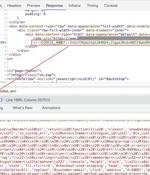Security News

A massive network of 75,000 fake online shops called 'BogusBazaar' tricked over 850,000 people in the US and Europe into making purchases, allowing the criminals to steal credit card information and attempt to process an estimated $50 million in fake orders. The cybercriminals host fake shops on previously expired domains with a good reputation with Google and typically pretend to sell shoes and clothing products at very low prices.
Cybersecurity researchers have discovered a credit card skimmer that's concealed within a fake Meta Pixel tracker script in an attempt to evade detection. Sucuri said that the malware is injected...

Russia's Prosecutor General's Office has announced the indictment of six suspected "Hacking group" members for using malware to steal credit card and payment information from foreign online stores. According to investigations, the six suspects started the malicious activity nearly seven years ago and managed to steal over 160,000 payment cards.

American Express is warning customers that credit cards were exposed in a third-party data breach after a merchant processor was hacked. This incident was not caused by a data breach at American Express, but rather at a merchant processor in which American Express Card member data was processed.

American Express is warning customers that credit cards were exposed in a third-party data breach after one of its service providers was hacked. In a data breach notification filed with the state of Massachusetts, American Express said that the breach occurred at one of its service providers used by their travel services division, American Express Travel Related Services Company.

Threat hunters have discovered a rogue WordPress plugin that's capable of creating bogus administrator users and injecting malicious JavaScript code to steal credit card information. The skimming...

Europol has notified over 400 websites that their online shops have been hacked with malicious scripts that steal debit and credit cards from customers making purchases. These attacks can go undetected for weeks or even several months, and depending on the popularity of the breached e-commerce platforms, cybercriminals can collect large numbers of payment card details.

The BidenCash stolen credit card marketplace is giving away 1.9 million credit cards for free via its store to promote itself among cybercriminals. BidenCash launched in early 2022 as a new marketplace on both the dark web and the clearnet, selling credit and debit cards that were stolen through phishing or skimmers on e-commerce sites.

Spanish airline Air Europa, the country's third-largest airline and a member of the SkyTeam alliance, warned customers on Monday to cancel their credit cards after attackers accessed their card information in a recent data breach. The credit card details exposed in the breach include card numbers, expiration dates, and the 3-digit CVV code on the back of the payment cards.

A sophisticated Magecart campaign has been observed manipulating websites' default 404 error page to conceal malicious code in what's been described as the latest evolution of the attacks. The...